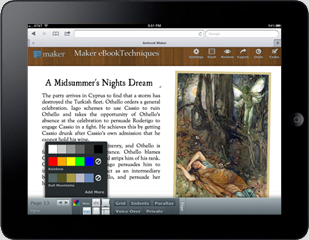Enhanced Ebooks - So What?
I’ve heard from any number of publishers and publishing consultants that there is not an economically meaningful market for so called "enhanced ebooks" (which are ebooks that include "features" like audio, video, and interactive elements) and that ebooks are best suited for "immersive reading" of mostly text products. Publishers seem to doubt that readers want or will accept anything other than a straight digital conversion of text based books.
I’m going to suggest that the experience of a so-called "enhanced ebook" is not meant to be the same as the immersive state of text based reading on the print page. If there is a comparative it should be with illustrated print books, which are usually not experienced the same way as readers experience a novel or nonfiction text either. Some have described the experience of these new kinds of books as "grazing." But I don’t think "grazing" is the right term for either experience, as I think it is reductionist. My experience of a book like the wonderful Longleaf, Far as the Eye Can See from UNC Press is not at all the same as my experience of the narrative text like The Forest Unseen from Viking. I don’t expect an ebook that engages me in visual and auditory experiences to be the same as one that engages me purely textually.
On the production side, I think the same comparison should apply. Publishing an illustrated coffee table size book today is economically a tremendous challenge. The cost of publishing is high, shelf and display space is highly constrained, and offshore printing means impossible supply chain problems. By comparison, the cost of publishing an illustrated book in fixed page layout, with or without enhancements, has come down tremendously. Every day the digital equivalent of shelf space increases, as more and more people buy tablets that display these books brilliantly.
Publishers and tablet vendors have by no means figured out how to make and sell digital illustrated books *yet* but the growth of the potential market is so persuasive, and the cost of production now so relatively reasonable compared to print, that the opportunity is becoming more compelling for publishers and creators. Audiences may not be there *yet* either, but we don’t need huge numbers when the breakeven threshold is so relatively low, and the potential for large profits from modest success is clear. Meanwhile, successful or otherwise, a print coffee table book still has to be printed, then shipped from an overseas printer, and then distributed locally, whereas a successful digital equivalent has no such constraints and higher margins. And importantly, there are effectively no returns of digital books.
In my opinion, the creation of more and better fixed layout ebooks, combined with more and better tablets on which to read them, and compelling economics for publishers, will drive the market for these products.
And ultimately, this is not an either/or choice, but an additive situation—books that take advantage of the many features that the digital book experience provides will create new and different consumption experiences for readers, that will do not need to replace or subvert immersive text reading for most readers. Why not? We watch TV and go to the movies, and we - or at least many of us - still somehow find the time to read books. Digital devices give us more opportunities to read text and a chance to experience books in new ways altogether. Publishers are now in position to create new products for new readers and expand the market for our content. In fact, what may be lost sooner than later, is the large-scale market for illustration heavy, beautifully designed print books that has thrived for the several decades prior to the past few years.

11.2.12
Thanks to Ron Martinez for reading, commentary and advice


